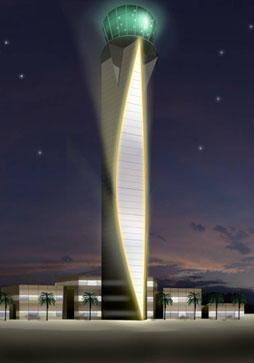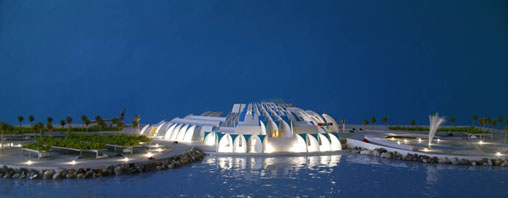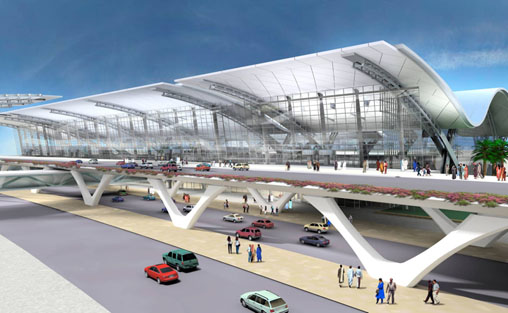


![]()
ONLINE
The Most Sophisticated Airport in the World
Editors’ Note
A licensed private pilot, Abdulaziz Mohammed Al-Noaimi holds diplomas in both air traffic control and telecommunications and a BSc in business administration. In addition to his current post with the Civil Aviation Authority, which he assumed in 2002, Al-Noaimi also serves as Chairman of the New Doha International Airport Project steering committee and of the New Port Project steering committee, and is a member of the board of directors for Qatar Airways and Qatar National Hotels Company. He has previously served as the Director of Doha International Airport and as Director of Qatar’s Department of Civil Aviation and Meteorology. Al-Noaimi is also the Executive Chairman of the Arab Civil Aviation Commission.
The State of Qatar is distinguished by its strong and developed ties with the international community in different fields. Currently, the State of Qatar is an active member of the United Nations and its affiliated organizations such as the International Monetary Fund, the World Trade Organization, and Gulf, Arab, and Islamic organizations. Qatar is also a signatory of many bilateral economic agreements with European, Asian, African, and American countries.
Recently, London hosted the fourth Finance & Investment in Qatar conference. During the conference, many participants described Qatar as the “Silk Road” between East and West. Qatar is preparing for a new economic era of economic diversity and is allowing multinational companies to invest in key strategic projects.
As part of Qatar’s economic boom under the wise leadership of His Highness the Emir of Qatar, Sheikh Hamad Bin Khalifa Al-Thani, the government of Qatar is adopting new policies to promote the trade, tourism, and investment sectors. Currently, Qatar is witnessing a major development in its airport and seaport. Such development will lead to a huge investment in, and play a vital role in, the movement of sectors such as transport, cargo, and affiliated industries. The State of Qatar has also allocated billions of dollars to investment in the public sector to enable Doha, the capital of the State of Qatar, to meet the needs of an increasing number of inhabitants, tourists, and investors.
New Doha International Airport (NDIA)

The planned control tower
One of the most prestigious major projects in the State of Qatar has a direct link to Civil Aviation Authority activities. I have been honored to act as the Chairman of the NDIA Steering Committee, which, upon the instructions of His Highness the Emir, was charged to design and construct the most sophisticated and advanced airport in the world – a world-class international gateway. Upon completion, the airport will initially handle 24 million passengers and 1.3 million tons of cargo per year. Its ultimate capacity will increase to 50 million passengers and 2 million tons of cargo per year. The airport terminal will have 40 contact gates and 19,000 square meters of space allocated for concessions including cafes, restaurants, duty free shops, and associated facilities.
One of the most important features of NDIA is its runways. They are designed to accommodate giant A380 aircraft. Qatar Airways will operate a fleet of these aircraft.
The NDIA steering committee adopted water as a major theme in the design of the new airport, in order to reflect the beautiful surroundings and background of the airport. The roof of the passenger terminal was designed to resemble a wave and the Emiri terminal resembles the sails of a boat. The air traffic control tower was designed to look like a half moon.

The Emiri terminal exterior, serving His Highness, Ministers, and VIPs
This project, upon completion, will turn Qatar into a major aviation hub in the region. The project will also play a vital role in promoting development in various economic spheres, including tourism and trade. It will also promote Qatar Airways as a national carrier. The airport is likely to be completed by early 2010, and the total cost of this phase is estimated at about $9 billion.
Due to the increase in passenger movements to and from Doha, in 2005, Law No. 26 was put into force to organize air travel agencies. The law states that any GCC (Gulf Cooperation Council) national can establish travel agencies in Qatar. This was part of the State of Qatar’s commitment to implement the GCC’s economic agreement.
Under the guidance and wise leadership of His Highness the Emir, the government of the State of Qatar has opted to follow open sky policies for free trade and transport. Thus, we will be opening our skies to all international airlines to increase the flow of visitors, investors, and tourists. In this regard, we have already signed an open sky agreement with the Kingdom of Bahrain and are looking forward to signing more agreements with GCC, Arab, and friendly countries.
The new airport will pave the way for local private aircraft, such as those owned by VIPs and businessmen, and air ambulances to operate from Qatar. A study was conducted and was forwarded to cabinet ministers, who approved the lease of aircraft by private companies to businessmen and VIPs, provided such aircraft have no more than 20 seats.
The Cabinet of Ministers recently issued a resolution pertaining to the lifting of restrictions on air tariffs. The Civil Aviation Authority is currently studying the implementation of this resolution.

The NDIA passenger terminal
New Qatar Sea Port (NQSP)
As the existing Doha Sea Port is unable to handle the volume of imports and exports, His Highness the Emir issued a decree for the establishment of a new port. This port will be located to the north of Mesaieed. International specifications relating to seaports will be highly considered while building this new port. The port is likely to be operational in the year 2013 and will include a free trade zone.
I was honored to head the steering committee for this project. The total cost of this project is estimated at 20 billion Qatari Riyals, or $5.5 billion. This port, once constructed, will be a major sea link between Qatar and the rest of the world. The port will have the capacity and capabilities to handle giant ships carrying more than 5,000 containers that cannot be handled at the current port.
The port will also play a vital role in importing and re-export to nearby countries. The project will serve the region’s increasing import and export activities, which have come about due to a fast-growing economy and the implementation of major projects in Qatar and nearby countries. The port will reduce the time and cost associated with importing and exporting. The preliminary study of the master plan of the project has been awarded to Scott Wilson Ltd., which has a head office in Hong Kong, and P.S.A. Africa Middle-East Pt. Ltd., which is based in Singapore.